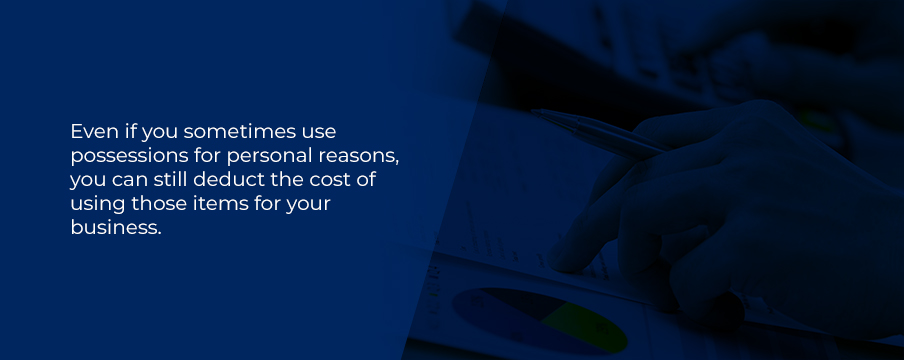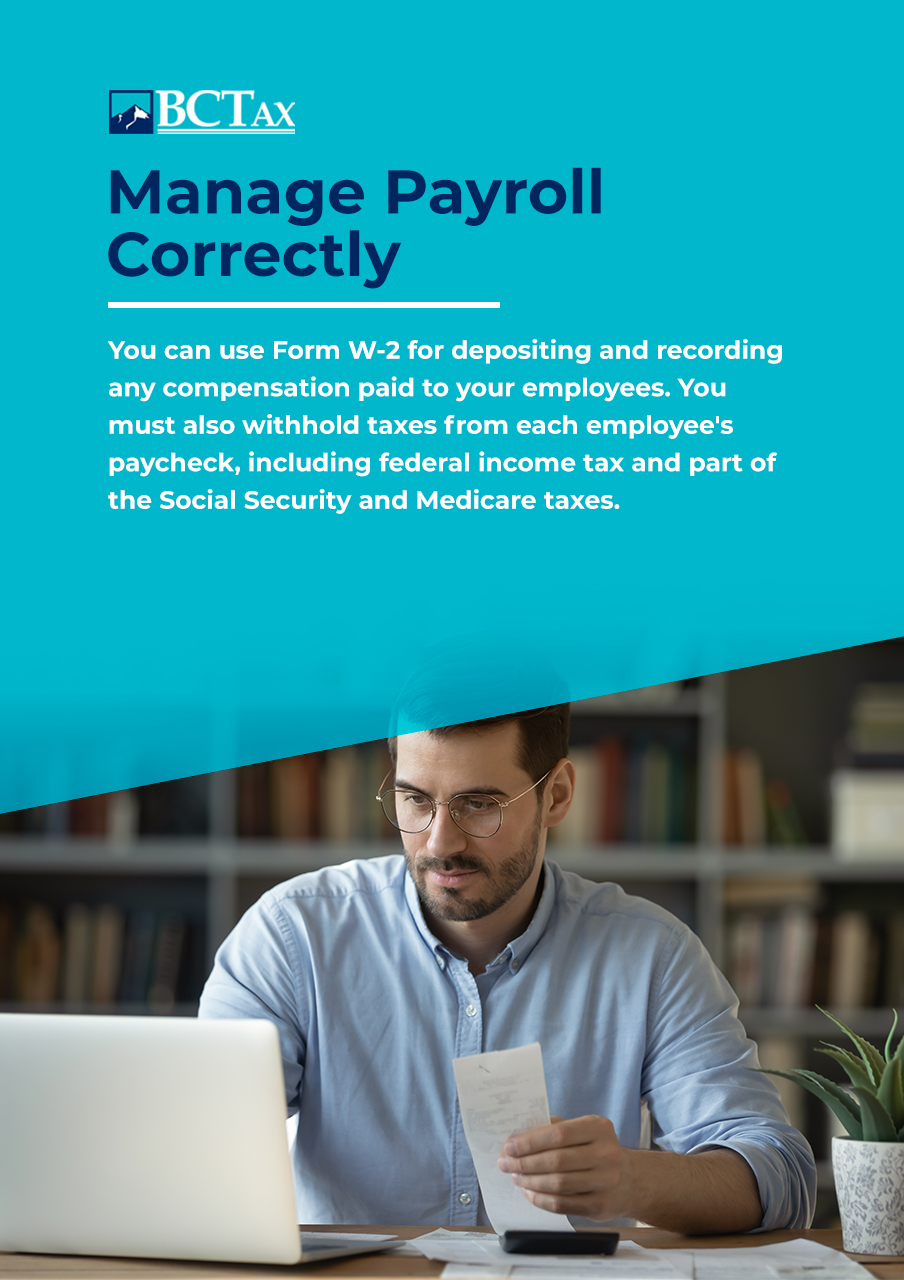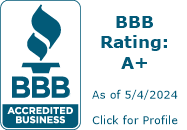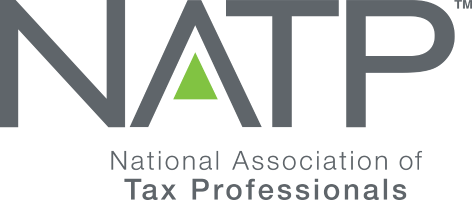As a small business owner, you have a lot to be proud of. You’ve built your dream into a reality and are working toward growth for yourself and your employees. While so many aspects of running your business are exciting and enjoyable, filing taxes is probably a lot more complicated than you’d like it to be. To help you negotiate the world of small business taxes, we’ve compiled these top tips for filing taxes for small businesses.
When it’s time to file federal income tax for your business, you want to be as prepared as possible. Learning some of the basic tax rules and what deductions to take advantage of can help you keep money in your account and grow your business faster.
11 Tips for Filing Taxes for Small Businesses
Running a company involves a lot of moving parts. Small business taxes are only one of the critical components to maintaining healthy financial records. Here are 11 of the best tax tips for small business owners.

1. Keep Accurate Records
Tax filing season is a hectic time of year for small business owners and accountants alike. You can cut back on additional worry and stress by beginning the process as early as possible. Start collecting your income and expense records at the beginning of the year to ensure your small business tax information is accurate when it’s time to file with the government. The IRS provides some examples of documents to keep, including the following:
- Credit card statements and receipts
- Cash register tapes
- Invoices
- Canceled checks
- Purchase and sale of assets invoices
- Bank account statements
It will be much easier to remember and correctly record financial data if you use accounting software or a spreadsheet. Throughout the year, consistently log all this information. Then, before filling out any tax form to report your business income, gather it all in one place. Keeping adequate records lets you know which deductions you can take and can prevent an audit.
2. Use the Correct Forms
Before you know which forms to include in your small business taxes, you must know your business type. Each classification requires different documents for tax filing, including a C corporation, S corporation, limited liability corporation, single-member LLC, limited liability partnership or sole proprietorship. If you have not already determined your business type, consult with an attorney and accountant to ensure you’re filing correctly.
Once you know your business’ classification, take a look at the forms unique to each type.
- Sole proprietorship: If you run a sole proprietorship, you need to fill out Schedule SE for your self-employment taxes, and a schedule C, also known as Form 1040, for business profit and loss.
- Limited liability partnership: To declare profits and losses of your LLP, fill out Form 1065.
- Single-member LLC: Like with a sole proprietorship, you’ll need Schedule C if you run a single-member LLC. However, you do not need to file Schedule SE.
- LLC: As with an LLP, an LLC must fill out Form 1065 to report profits, credits, deductions and losses.
- C corporation: The default corporation under IRS guidelines, C corporations file corporate tax returns on Form 1120. This type of business pays income tax on the corporate level and may pay taxes again on the individual level if business owners receive dividends.
- S corporation: The primary form for S corporations is Form 1120-S, which is an informational return. Because S corporations are pass-through taxation entities, business owners pay taxes at the individual rather than the corporate level.
Filing the correct document — or series of documents — for both your business and personal taxes ensures the IRS receives all your small business tax information correctly.
3. Understand Startup Expense Deduction
You put a significant investment into opening your startup. Many of the costs associated with opening a new business are capital expenditures, like purchasing property, equipment, software or other assets necessary to get a business up and running. These expenditures are not tax-deductible in the year they occur. However, one tax deduction covers specific startup expenses, which you can only take advantage of the first year you file your small business taxes.
As a business owner, the IRS allows you to deduct up to $5,000 of startup costs associated with creating or investigating your company’s creation. These may include:
- A formal survey of the new business’ potential markets, products, transportation facilities, etc.
- Advertisements for the company grand opening.
- Wages paid to employees during training.
- Fees for legal or accounting consultants.
4. Take Advantage of Capitalization Rules
To capitalize, rather than deduct, certain expenditures, the IRS allows specific strategies for recovering the cost of the item over time. These strategies include depreciation, amortization and depletion. Depending on what your business does, you can use any of these methods to gradually regain the amount you spent over a few years.
But the IRS also gives business owners some concessions for deducting capital expenditures through Section 179, which is a deduction that applies to tangible property used in a business. If you purchased tangible pieces of property typically included in capitalized expenditures, like vehicles and equipment, you might be able to fully deduct these costs on your taxes.
There are limits to what kinds of tangible property qualify for a Section 179 deduction. For example, you cannot deduct real estate, but you may deduct improvements to nonresidential real property. That means improvements to your company’s heating and air conditioning system, security system and roof could all qualify for this deduction. Other kinds of capital that may be eligible include machinery and vehicles.
Be sure your accountant understands capitalization rules when looking into these deductions. For example, you can often deduct the cost of repairing or replacing short-lived parts in vehicles or machines, though you have to recover the cost of improving those machines through depreciation. In general, maintenance is deductible while improvement is not.
5. Separate Business and Personal Expenses
It is vital to separate business and personal expenses so you can provide the IRS with accurate financial reporting. You can only deduct business-related expenses from your business taxes. However, if you’re the sole proprietor running a business from your home, the lines may become blurry.
Even if you sometimes use possessions for personal reasons, you can still deduct the cost of using those items for your business. For example, if you use a spare bedroom as your office, you may deduct expenses like mortgage interest, utilities, repairs, insurance and depreciation.
The same is true for a vehicle you use for personal and business reasons. The IRS states that you should keep a log of the mileage you drive for business to separate those costs from the times you use the vehicle for personal reasons.
It is also essential to keep business and personal finances separate. Use a different checking account or a designated business account for your business’ finances, and pay for business expenses with a separate credit card. Make sure only to run business expenses through the business checking account.
6. Deduct Qualified Business Expenses
Taking available deductions is a profitable strategy for you to minimize taxable income and retain more revenue that your business can then use to expand in the coming year.
Business-related expenses are the largest category of deductions you can make as a business owner. These expenses have to be ordinary and necessary for you to deduct them. That means they have to be typical and appropriate in your industry. Expenses that do not fall into this category include:
- Capital expenses
- Cost of goods sold
- Personal expenses
Here are some of the deductible expenses you may incur that relate to operating your business.
- Employees’ pay: You can deduct the amount you pay your employees for the year, whether in cash, services or property. Bonuses, commissions, vacation allowances, awards and fringe benefits like meals, lodging and transportation are all tax-deductible.
- Rent: If you rent the building out of which you operate your business, you can deduct those expenses too. If you run your business from a home office, you can deduct rent paid in advance and rent for your home.
- Interest: If you borrow funds for business purposes, the interest that accrues on those funds may be tax-deductible. You can deduct business interest expenses only if you are legally liable for the debt and both you and your debtor intend for you to repay the debt.
- Retirement plans: Retirement plans for your employees and yourself give you tax advantages so you can set aside funds.
- Taxes: You can deduct specific local, state and federal taxes which are attributable to your business. Real estate taxes are deductible, but federal taxes are not. If your company is a corporation or partnership, you can deduct state and local income taxes.
- Insurance: You can generally deduct premiums related to particular business insurance types, including liability, credit, malpractice and workers’ compensation insurance.
7. Deduct Charitable Contributions
Making charitable contributions is an essential way many small businesses connect with their communities and customers. If you make donations to a qualified organization, those are entirely tax-deductible. Eligible organizations include but are not limited to:
- Foundations operating only for religious, scientific, literary, charitable or educational purposes, or for the prevention of cruelty to children or animals.
- Disaster relief organizations.
- War veterans’ organizations.
- Any governmental body, if you intend your contribution for public purposes.
Only cash donations made to a qualified organization are deductible. However, you can maximize a charitable contribution to a nonqualified organization by donating appreciable stocks instead of money. If you contribute stock to an organization, you can only deduct its fair market value when you donate the stock, minus its appreciation since you purchased it.
8. Collect Health Care Tax Credit
If you pay for your employees’ health care, you may qualify for the Small Business Health Care Tax Credit that helps cover the cost. Generally, you would need to enroll in a Small Business Health Options Program to qualify. You should meet all of the following conditions:
- Your small business has fewer than 25 full-time employees.
- The average salary for your employees is $56,000 or less.
- You pay at least 50% of the costs of your full-time employees’ premiums.
- You offer SHOP coverage to full-time employees.
The maximum credit you can earn for your business is 50% of the premiums you pay. Because credits are on a sliding scale, smaller companies benefit the most. For example, if your business has fewer than 10 employees with an average annual salary of $25,000 or less, and you contribute $70,000 to their health insurance premiums, you can receive $35,000 as a tax credit.
9. Manage Payroll Correctly
Paying employment tax is another part of maintaining accurate tax records. Usually, this includes administering payroll and withholding taxes from your employees’ paychecks. Accurately recording and dispensing payroll impacts your employees’ tax bracket and the tax fees your company owes.
You can use Form W-2 for depositing and recording any compensation paid to your employees. You must also withhold taxes from each employee’s paycheck, including federal income tax and part of the Social Security and Medicare taxes. After withholding Social Security and Medicare, you pay a matching amount for your employees’ health care benefits. You can use Form W-4 to determine what amount to pay.
The IRS checks every quarter to see if your business has paid these payroll taxes, which is a critical aspect of staying up to date on tax payments. You can automate and simplify the process by using a payroll service or software to file taxes on time.
10. Be Aware of Deadlines
You’ll want to stay on top of income and loss data throughout the year to be timely with your taxes. Tax filing deadlines can loom large, but you and your accountant can complete them on time if you stay aware of the filing requirements.
You’ll need to file self-employment taxes, which are your quarterly “dues” for Social Security and Medicare coverage as a small business owner. These deadlines are:
- April 15
- June 15
- Sept. 15
- Jan. 18
Other tax forms are due on a rotating basis throughout the year, depending on the type of business you run. You can stay ahead of tax filing and avoid owing back taxes by frequently communicating with your accountant. Here are some of the other standard deadlines.
- Feb. 1: The deadline for employers to mail out W-2 forms to employees.
- March 15: This date is the deadline for filing Forms 1120 and 1120-S for S and C corporations. It is also the deadline for LLCs and LLPs to file Form 1065. Additionally, March 15 is the last date to request a six-month extension for filing these documents.
- April 15: If you operate a single-member LLC or a sole proprietorship, this is the deadline for filing business returns.
11. Ask for Help When You Need It
You may realize by now that filing taxes for a business is much different than filing taxes for an individual. As a small business owner, you are responsible for completing both. With several kinds of forms involved and a unique set of rules for each one, it could be easy to get overwhelmed. The tax system is complicated and requires a level of familiarity before you can navigate it with confidence.
Accountants, enrolled agents and other tax professionals spend years studying IRS tax codes so they can help individuals and business owners file taxes correctly. Leaning on a trusted source for professional expertise could save you from costly missteps.
Contact the Tax Resolution Experts at BC Tax
If your small business needs help with tax resolution or filing back taxes, BC Tax is here to help. At BC Tax, we offer small business tax help that reduces our clients’ tax debt and stress. Our team of experienced tax professionals will partner with you to help you understand your rights and develop a solution to your tax problems.
We understand that offering the best tax solutions requires finding the best tax experts, which is why we’ve built our team with the most experienced tax negotiators around. During the process, we’ll take over all communication with the IRS so you can breathe again while our certified consultants negotiate the best resolution possible.
If you’re ready to manage your tax problem and get back to focusing on your growing business, contact us for a free, no-obligation consultation.

 1-800-548-4639
1-800-548-4639











